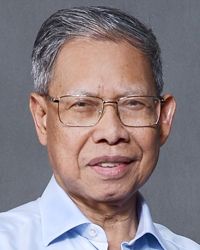BIG businesses drive GDP, while small businesses drive job creation. This guiding principle has shaped economic policies globally and in Malaysia.
Given population concentrations in major cities, policymaking has long focused on urban areas. But in recent years, digital infrastructure and technology have proven to be great equalisers, especially for entrepreneurs in secondary cities and rural communities.
In this conversation, former cabinet minister Datuk Seri Mustapa Mohamed discusses strategies of revitalising Malaysia’s rural economy and laying the foundation for a more inclusive future with the country head of Shopee, Monee and Garena, Sea Ltd Malaysia’s country head Terence Siau.
What are some of the key challenges facing rural communities and secondary cities in Malaysia, and how can digital entrepreneurship address these issues?
 Datuk Seri Mustapha: I believe digital entrepreneurship, especially e-commerce, can be transformative.Datuk Seri Mustapa Mohamed (MM): We’ve long discussed uplifting rural communities, but are we doing enough? Our government has always been supportive of rural development. However, a lot more needs to be done to stimulate online businesses and entrepreneurship.
Datuk Seri Mustapha: I believe digital entrepreneurship, especially e-commerce, can be transformative.Datuk Seri Mustapa Mohamed (MM): We’ve long discussed uplifting rural communities, but are we doing enough? Our government has always been supportive of rural development. However, a lot more needs to be done to stimulate online businesses and entrepreneurship.
Poor digital access in some areas limits their ability to leverage online platforms. Many rural businesses remain unregistered, making it hard to access policy support, grants and other financial incentives. Strategic policies and innovative, accessible technology are key to address these challenges.
I believe digital entrepreneurship, especially e-commerce, can be transformative. Rural entrepreneurs can now market their products to national and international audiences.
Terence Siau (TS): Exactly. E-commerce empowers rural entrepreneurs to build sustainable businesses within their communities.
It opens up broader markets and provides tools to compete effectively from anywhere, creating local jobs and boosting local economies.
At Sea Ltd, we work with the government via Shopee to equip rural micro, small and medium sized enterprises (MSMEs) with digital skills.
Shopee University, for instance, offers free training on store performance, advertising strategies and customer engagement. We also provide market insights and best practices to help sellers grow.
What role do e-commerce platforms play in bridging the digital divide for rural entrepreneurs, especially women?
TS: E-commerce offers rural women flexible opportunities to earn from home, addressing mobility and employment barriers.
While 92% of urban households have internet access, only 68% of rural ones do, and just 58% of rural women have access, compared to 84% in cities.
 Siau says digital banks simplify financing, allowing users to apply, manage loans and more online.We partner with NGOs and agencies to improve digital literacy and access to capital.
Siau says digital banks simplify financing, allowing users to apply, manage loans and more online.We partner with NGOs and agencies to improve digital literacy and access to capital.
For example, the PUPUK@Shopee programme with the Malaysian Communications and Multimedia Commission (MCMC) provides step-by-step guidance for micro-entrepreneurs.
Take Bella Hazaha, she used Shopee Live to revolutionise sleepwear with trendy, modest designs. She now sells over 1,000 units daily and is among our top sellers.
MM: Rural women hold huge potential.
It’s vital we build an inclusive and sustainable ecosystem, aligned with Malaysia’s development plans.
When rural women succeed, the benefits ripple through families, communities, and the national economy.
How do digital banks address the unique challenges faced by MSMEs in accessing financing, particularly in rural and underserved communities?
MM: Digital banks eliminate traditional barriers like complex paperwork and distance to physical branches.
Only 39% of Malaysians have access to bank loans and 55% of adults remain underbanked.
Digital banks – licensed by Bank Negara – must proactively reach underserved MSMEs.
TS: Digital banks simplify financing. Entrepreneurs can apply, check eligibility and manage loans entirely online, removing the need to travel or queue at branches.
What’s being done to boost the capacity of rural entrepreneurs?
MM: Rural entrepreneurs have great potential. Many are in the East Coast Economic Region, where programmes like Empower have trained hundreds in digital skills.
In Jeli alone, 11 internet centres support local growth, part of 1,000 centres nationwide. Covid-19 pandemic showed that rural Malaysians can thrive online.
During my time as Minister in the Prime Minister’s Department, I led efforts through MyDigital Corp to drive this digital agenda.
In Jeli, over 30 online entrepreneurs operate in fields from food to fashion, where monthly sales range from RM10,000 to RM200,000, and some employ over 50 staff.
We brought in the Malaysia Digital Economy Corporation (MDEC), Shopee, Telekom Malaysia and Microsoft to run upskilling initiatives.
More must be done to enhance digital literacy among these entrepreneurs.
TS: Sea Ltd strongly supports government initiatives. Most Shopee sellers are MSMEs, such as Batik Cantik.
Launched in 2022 in Kuala Terengganu, it started with one daily order. Now, it receives over 100 daily – a remarkable growth story.
MM: Rural entrepreneur networks are growing. I helped set up an association of online entrepreneurs in Jeli, now with nearly 200 members.
They connect through WhatsApp to share experiences and support one another.
I’m proud of their progress – driven by government support and private sector collaboration, especially with partners like Sea Ltd who help build their digital and marketing capabilities.
